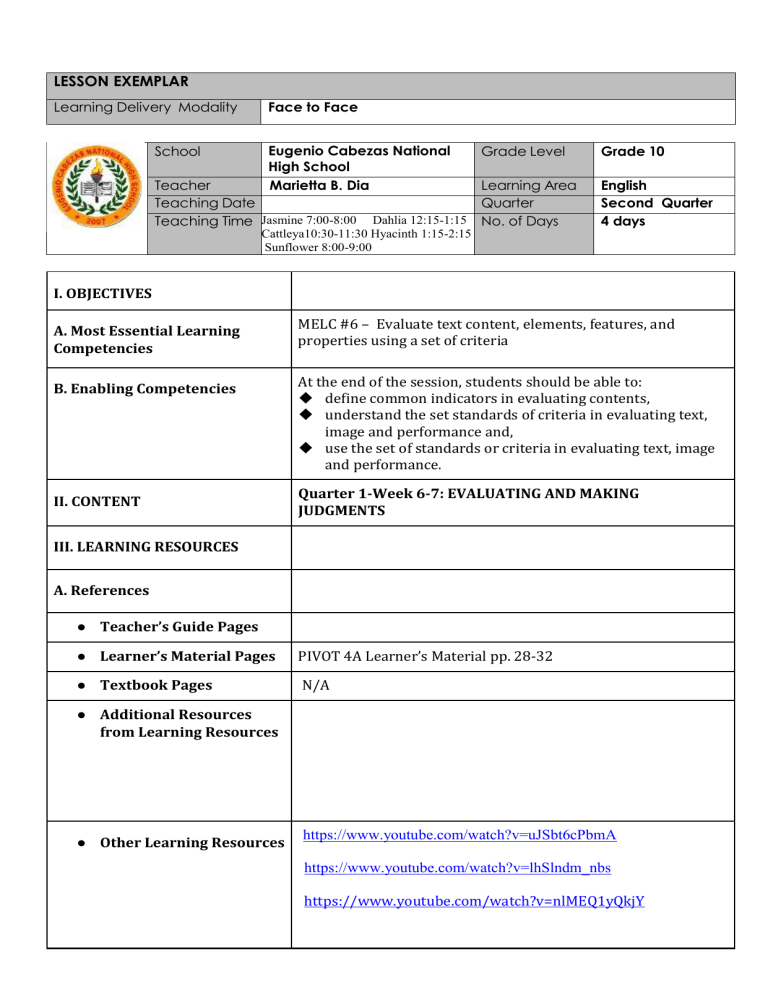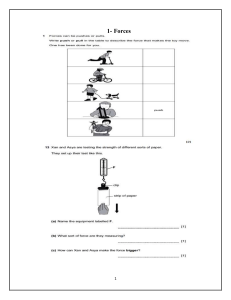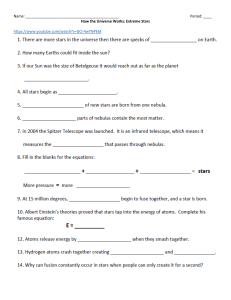
LESSON EXEMPLAR Learning Delivery Modality School Face to Face Eugenio Cabezas National High School Marietta B. Dia Teacher Teaching Date Teaching Time Jasmine 7:00-8:00 Dahlia 12:15-1:15 Cattleya10:30-11:30 Hyacinth 1:15-2:15 Sunflower 8:00-9:00 Grade Level Grade 10 Learning Area Quarter No. of Days English Second Quarter 4 days I. OBJECTIVES A. Most Essential Learning Competencies MELC #6 – Evaluate text content, elements, features, and properties using a set of criteria B. Enabling Competencies At the end of the session, students should be able to: define common indicators in evaluating contents, understand the set standards of criteria in evaluating text, image and performance and, use the set of standards or criteria in evaluating text, image and performance. II. CONTENT Quarter 1-Week 6-7: EVALUATING AND MAKING JUDGMENTS III. LEARNING RESOURCES A. References ● Teacher’s Guide Pages ● Learner’s Material Pages PIVOT 4A Learner’s Material pp. 28-32 ● Textbook Pages N/A ● Additional Resources Jon from Learning Resources R ● Other Learning Resources https://www.youtube.com/watch?v=uJSbt6cPbmA https://www.youtube.com/watch?v=lhSlndm_nbs https://www.youtube.com/watch?v=nlMEQ1yQkjY B. List of Learning Resources for Development and Engagement Activities N/A IV. PROCEDURE Approach : Student-centered Approach A. Introduction What I need to Know Evaluating a text or performance has always been subjective in its very sense. Subjectivity in giving judgment has always been an issue in terms of fairness. In addressing this concern, criteria have been helpful tools in establishing objectivity in evaluating a text or performance. Simply, objectivity allows the evaluator to develop sound and fair judgment. Students are expected to establish a sense of objectivity in evaluating a picture, text and/or performance using a set of criteria. What’s New Learning Task 1: Students will be playing a noontime game in Phils. television titled “Bawal Judgmental”. In every item a student will be given the chance to answer who is being referred to in the statement. They will answer all ten (10 ) statements. Process questions: 1, What is your basis in making such judgment? 2. Was it easy to make such judgment/s? 3.Will you also make the same judgment the next time around? B. Development What I know? Learning Task 2: Listen to the song titled “Panalo”. There have been a number of renditions of this song. Two of the famous versions are those of EZ Mill and Sassa. Listen to their renditions and assess their similarities and differences using the questions below. Process Questions: 1. In terms of emotions, which rendition is more charismatic and interesting? 2. Which of the two has better vocal quality and voice range? 3. Which rendition portrays better intonation, diction and enunciation? What is In The class will further discuss the Evaluation and Making Judgement in using criteria as a set of standards, as well as the importance of using criteria in making judgments. Moreover, the teacher will give examples and activities to the learners. What is it Learning Task 3: Read and examine the poem below written by William Ernest Henley, a famous British poet known for his famous Sonnet the “Invictus”. Then, answer the questions that follow. Invictus BY WILLIAM ERNEST HENLEY Out of the night that covers me, Black as the pit from pole to pole, I thank whatever gods may be For my unconquerable soul. In the fell clutch of circumstance I have not winced nor cried aloud. Under the bludgeoning of chance My head is bloody, but unbowed. Beyond this place of wrath and tears Looms but the Horror of the shade, And yet the menace of the years Finds and shall find me unafraid. It matters not how strait the gate, How charged with punishments the scroll, I am the master of my fate, I am the captain of my soul. Process Questions: 1. What significant characteristics of a person are described in the poem? 2. How does the persona live his life? 3. How will you relate the context of the poem to your own life? 4. What do you think is the reason why William Ernest Henley entitled his work as such? C. Engagement What is More Learning Task 4: Evaluate the poem above using the criteria below. By group, students will indicate their answers. (INVICTUS by William Ernest Henley) INDICATORS Content Cohesion Grammar Mechanics Word Choice Tone OBSERVATIONS/EXPLANATIONS What I can Do Students will watch a video clip of Catriona Gray during the Miss Universe 2018. Examine how she responded to the question. Students will then answer the following questions: Process questions: 1. What important lessons she learned in her life? 2. How could she apply it in her time as Miss Universe? 3. According to Catriona, how can we have an amazing world? D. Assimilation What I Have Learned Learning Task 6: Evaluate the answer of Catriona using the criteria below. Write your answers in your notebook. INDICATORS Content Cohesion Grammar Mechanics Word Choice Tone OBSERVATIONS/EXPLANATIONS What I Can Achieve Learning Task 7: Miss Universe 2018 Catriona Gray set a clear landmark with her performance during its 2018 edition. Read the final question and their final answers during the contest. Using a Venn Diagram Compare and contrast their answers by completing the diagram below. "What is the most important lesson you've learned in your life, and how would you apply it to your time as Miss Universe?" 1. Venezuela: Sthefany Gutiérrez "I grew up in a family filled with women and each one of them taught me something very important. But what I always remembered is that by working hard and chasing for our dreams, and by having courage and strength and willingness to achieve these dreams, we can achieve anything we want in this lifetime. And tonight I am proving this, I am here at Miss Universe." 2. Philippines: Catriona Gray "I worked a lot in the slums of Tondo, Manila. And the life there…it's poor, and it's very sad. And I've always taught myself to look for the beauty in it. To look in the beauty in the faces of the children, and to be grateful. And I would bring this aspect as a Miss Universe to see situations with a silver lining, and to assess, where I could give something, where I could provide something, as a spokesperson, and if I could teach also people to be grateful, we could have an amazing world where negativity could not grow and foster, and children would have a smile on their faces." V. REFLECTION Prepared by: I understand that___________________________________ I realize that ______________________________________ I want to know more about ___________________________ Noted by: MARIETTA B. DIA APRIL L.MACAM Teacher I Assistant Principal II


